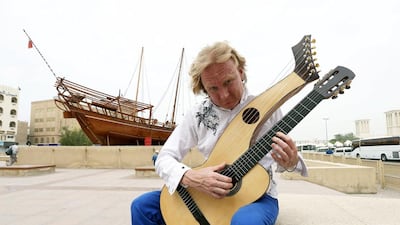Jason Carter has played his harp guitar in Afghanistan, Pakistan, Iran, Mozambique, Saudi Arabia – and even in North Korea. For the past two weeks, the Briton has been touring the Emirates playing with traditional musicians. He’s also on a mission to rediscover the music of Emirati pearl divers.
How did you first end up in the UAE?
I started playing guitar when I was 9 – I’m more or less self-taught – and I’ve always been interested in Arab music. I play the harp guitar, an instrument originally from the baroque period, which is basically a guitar with more strings. The extra strings are played like a harp.
In 1993 I answered a London newspaper ad for a Spanish guitarist and for three years I played at the old Dubai Hilton. I’ve been coming here every year since, so I’ve always kept an affinity with the Emirates.
What are you doing here this time around?
I’ve been travelling around the country meeting Emirati musicians to make a Belgian radio documentary about how music can be a dynamic platform for intercultural dialogue. I contacted cultural centres in each emirate, they gave me contact details for musicians, so I’ve been knocking on doors – the more spontaneously, the better. I speak basic Arabic, but once the music gets going, language is not really needed.
I’m also going to coastal areas of the Emirates in search of the remaining pearl divers, to make a separate documentary about their music, which was so crucial to the way they lived. I’ve played with pearl divers in Kuwait and Bahrain. They would have songs about preparing for their trips and leaving their loved ones behind. And each diver would have his own song, so when he was diving, the others would sing a song about him, which would last for as long as he could hold his breath. Pearl divers from different emirates would never have met and their music would be different. So the idea is to get them together for a concert, hopefully with a big-name Emirati singer, to be held on National Day. New York University is interested in me doing this project under their fellowship programme. I’m really excited about it.
You are one of very few people to perform in North Korea. How did that come about?
Eight years ago North Korea had just launched a nuclear missile and I was intrigued. I emailed the British Embassy there and mentioned the cultural projects I had done with the British Council and they put me in touch with the government. I heard nothing for months and forgot all about it. Then I got a strange phone call out of the blue. I met the North Korean ambassador in London, who said: “I can see that you like to visit ‘axis of evil’ countries – welcome to North Korea.” Everything about North Korea was so bizarre and abstract. I had a minder, a security guard and a translator with me all the time and it was tedious and stressful, being intensely monitored. I played five concerts, five nights in a row to an average of 3,000 people a night and those moments on stage were amazing. Being able to address such large groups in public was extremely rare for a foreigner, because the government is afraid of what you might say. I wasn’t allowed to speak to people, which was quite frustrating, but I could communicate by playing to them. The guitar had been banned there until recently.
A year later, you were invited by the British Council to teach in Afghanistan. How was that?
I worked with old Afghan musicians at Kabul University for a month. The Taliban had banned music completely and at that time they were trying to bring it back. It’s the country I’ve had the best cultural dialogue with. I went to bed every night exhausted but full of ideas. The Afghans I met there were so generous. I felt safer with locals than when I was travelling with British Council protection. Just after I left, the British Council was blown up. Things are intense in Kabul, you see a lot of weaponry and you feel vulnerable. When you survive it, you think: “Wow – I’m alive!”
• More information on Jason Carter can be found at jasoncarter.net and about his mission to build bridges between cultures through music at jesseralwadi.org
artslife@thenational.ae

